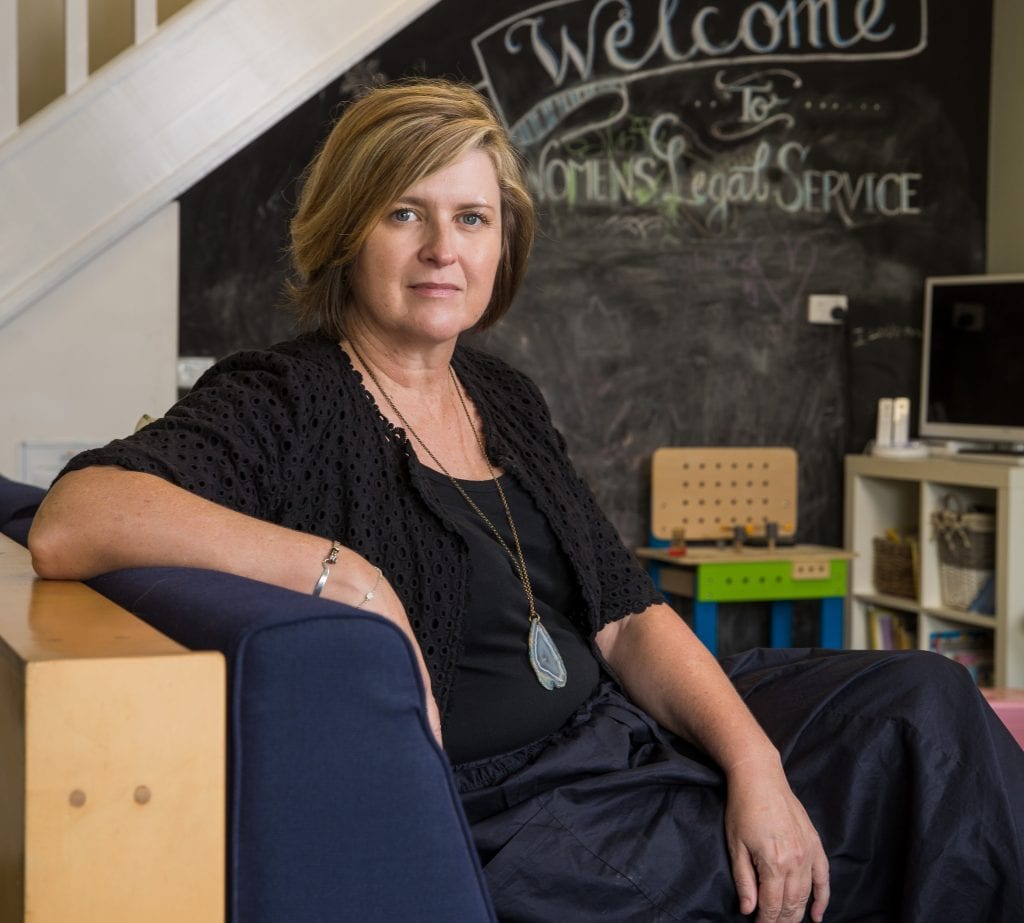These statistics are chilling. They highlight the magnitude of the domestic violence crisis and how badly we need to shift the status quo.
As the CEO at Women’s Legal Service Queensland, Angela Lynch deals with this crisis on a daily basis. A community legal centre, WLSQ provides free state-wide legal and social work services to women who are in the throes of domestic violence. It’s an organisation run by women for women.
Leading a small team as well as 180 volunteers, Angela works on a range of initiatives and reforms to better assist and support victims of DV. Last year, the organisation provided help to over 11,000 Queensland women.
It’s no surprise therefore, that Angela was named this year’s emerging leader in the legal sector at the Women’s Agenda Leadership Awards. We caught up with her recently to discuss her future hopes for WLSQ and why funding makes such a critical difference in DV support.
How does the average day play out for you?
My days are really varied. I check in with staff, I attend case management meetings where the solicitors workshop best practice responses to particular legal scenarios, I meet with stakeholders and help develop new programs, I meet with politicians and policy makers to give them information on the issues that impact our clients, and I speak to the media on topics relating to domestic violence and women’s interactions with the law.
What does it mean to you to be awarded emerging leader in the legal sector in 2017?
I’m honoured to be among such impressive and esteemed women. I was inspired and energised by the other finalists and it was fantastic to be amongst such a broadly experienced group of women who work in varying fields such as IT, science, new start-ups. The experience was richly rewarding to interact with such talented women who you would probably never otherwise meet.
What is your biggest source of inspiration?
Our clients, volunteers and staff are why I do what I do. The women we see are depleted emotionally, financially and sometimes physically from years of abuse and violence. Their resilience, bravery and courage in rebuilding their lives is inspirational. Knowing that our service has a real and tangible impact on the lives of vulnerable women on a daily basis, motivates me. As I said on the day when accepting my award, when you are a DV survivor with everything taken from you – who wouldn’t want a strong feminist lawyer next to you advocating in court for your right and your children’s right to safety? Who wouldn’t be motivated by this? Our WLS volunteers and staff are on the frontline every day. At times the work is exhausting, emotionally draining and challenging. But they show up each day and show such dedication, hard work and commitment to achieving the best outcomes for our clients. Their drive and commitment is inspirational.
What are your big career-goals over the next ten years?
My sole focus has been on helping women and their kids affected by domestic violence to get back on their feet. I feel privileged to have had the opportunity to work in so many different roles here at Women’s Legal Service. I’ve worked at the coalface, delivered large national projects such as the Penda Financial Empowerment App and driven reform campaigns that have made our laws more just and safe for our clients. Over the next five years I’ll be working to develop my leadership skills to ensure WLSQ is well placed into the future. With such a dynamic environment it’s hard to predict where we’ll be in ten years! But whatever I’ll be doing, I’ll be in this field.
What key attributes make a great leader?
I think good leaders are collaborative, courageous and wise. They’re collaborative in that that they engage in two way communication with their teams and make it their business to understand their strengths. But they also need courage and wisdom. Sometimes leaders have to make unpopular but necessary decisions. Having the courage to make these decisions and the wisdom to know when, defines a great leader.
Why do you think it’s important that women put themselves forward for awards?
It’s so important to acknowledge the vital contributions women make. We tell our clients to believe in themselves all the time, but we know women often don’t do this in a professional context. It’s important to follow our own advice. Young women in the profession also take note of awards. They can’t be what they can’t see, so it’s important we show young professionals the types of success they can work towards.
What big change/s do you wish to see in domestic violence services/support over the next decade?
I would love to see long term, certain funding for specialist legal services that help women experiencing domestic violence and specialist women’s community services. This funding surety would give us a solid base for us to help ourselves and help even more women. There are many elements of the law and legal system that needs changing and need to be better informed and reflect women’s experience of domestic violence and sexual violence. We absolutely need to keep violence against women on the public and social agenda. We’ve come a long way but there there’s still much to fix.
What would the world look like, if more women led?
I like to think workplaces would be little more inclusive if more women led. Conditions would be more flexible, with better childcare options. Workplaces that see and value the whole person would be the norm.
What’s the best advice you’ve ever been given?
There’s a Sheryl Sandberg quote that: “True leadership stems from individuality that is honestly and sometimes imperfectly expressed… Leaders should strive for authenticity over perfection.” I try to live by this.


